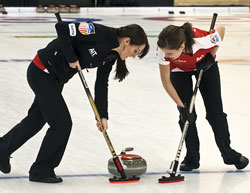Some people are managers, and some are individual contributors; two very different species. Both are vital to the success of a company, which means both can make or break that success.

Most individual contributors – engineers and technologists, for instance – are happy to do their thing and leave the bigger picture to their managers; at least, until they progress – as some of them do – to become technical leaders, when their input to management strategy becomes invaluable. But the individuals can’t do their thing unless the managers do theirs, and at times it seems that a manager is unaware of what their role really is.
To my mind, the most important part of a manager’s role is to remove the hurdles that prevent their subordinates from doing their job!
If you think that’s too obvious to merit mention, you’re living on a planet I have yet to visit. In many companies the engineers are struggling to do a great job – what they want and love to do – in the face of major hurdles placed in their path. Not only does management often fail to remove the hurdles – it is sometimes the one who placed them there in the first place.
Of course, the managers don’t normally do this with any malice; they mean to run the business in a structured manner. It’s just that what seems structure to them may be destructive to their people’s ability to innovate, or solve problems, or express the agility that is necessary to run the business optimally. This may come from micromanagement, some manager’s desire to know every minor detail and be a part of every decision; it may come from lack of trust in the subordinate’s intelligence; it may come from stifling budget control processes… there are many causes, but the result is always the same: the engineers, or other individual contributors, are disempowered in their job, and soon become dispirited and either leave or retreat into an attitude of Rosh Katan.
The best way I know to explain the role of a manager comes from the sport of Curling. Not that I’ve ever seen this sport outside of a TV screen; after all, it’s played on ice, a commodity not abundant in my hot country. Anyway, the players have to slide kettle-like granite stones across the ice so they come to a stop as close as possible to a target marked on the ice. And what got my attention is this: as the stone slides along, there are two team members equipped with brooms, which they use to sweep the ice ahead of the stone. This reduces friction, and when it is done expertly, a stone will travel both farther and straighter.
And that, my friends, is exactly the role of a good manager: to sweep away all obstacles in front of their employees, so they can get farther and on a straighter path. Managers, after all, don’t produce anything themselves; they’re measured on the output of their subordinates. What better way to increase this output than to empower the subordinates by eliminating all the hurdles they encounter, especially those that are outside the subordinate’s specialization? If you manage engineers, let them handle the engineering problems – there are more than enough to keep them busy – and focus on dealing with the budget paperwork, and the required supplies, and resolving conflicts with other business units, and the bureaucracy.
One gentleman who got this right was Winston Churchill: when Alan Turing wrote him that the code breaking effort at Bletchley Park was hamstrung by lack of resources, Churchill wrote on the letter “Make sure they have all they want on extreme priority and report to me that this had been done”. He added his famous red “Action this day” sticker and handed this to his staff. Churchill couldn’t break a code, but he knew how to sweep away the logistical nightmare that was threatening the scientists’ ability to execute this critical task.
Image credit: Halo Photographs


Dear Nathan,
You’re notes are inspiring, as usual.
Nonetheless, I believe the readers, and myself among them, are in need of an example that doesn’t focus on the lack of resources as hurdles (i.e., funds or other consumable items that are acquired by spending of funds)
As a less-then-novice manager, I encounter that the hurdles of my subordinates are more “fringe” – than just lack of resources. For example: “The lack of inherent priority associated with an action”, “Incoherent understanding of the action needed and its effects on other action items”, “Mitigating the risk of an action to zero”, “Indifference to maintaining a chronological span of an action” – all these are examples of hurdles that my subordinates face.
These hurdles cannot be removed by only increasing the resources available.
These hurdles are to be removed by an “endless”, ongoing training and study – that, the company just doesn’t have the time to.
So often, I tend to micromanagement, acting as a “fire fighter”, barely flexible enough to attend my own tasks.
I want my subordinates to actually be a mirror image of the company and all its informational items and data. How do I remove the hurdles to get there ?
Thank you !
Oded
Nathan,
You hit the nail on the head. In my practice, I attempt to do as you have stated; sweep away the road blocks just ahead of the technical train so that the engineers can stay focused and efficient.
Kind regards,
Dave
Well done, Dave!
Nathan,
We were raised and trained similarly, and we share the same belief in management’s role.
I liken it to the loggers who make sure the logs are floating downstream. And no, I haven’t seen them in real life either. When a logger sees a logjam, he goes and sorts out the logjam so that the logs continue moving ahead …
Boaz
Good analogy, Boaz!